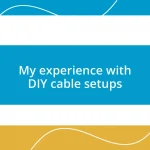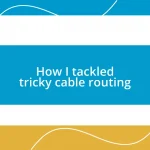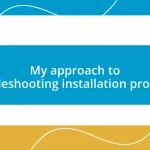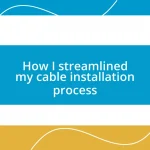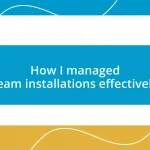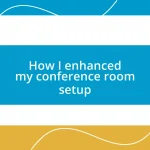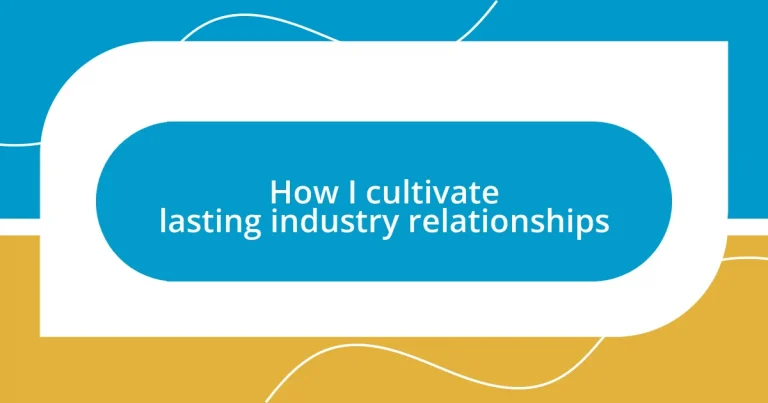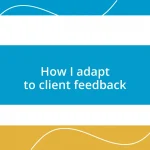Key takeaways:
- Industry relationships are invaluable; they can provide guidance, support, and open doors to new opportunities.
- Effective networking requires authentic engagement, consistent follow-ups, and active participation on social media to maintain connections.
- Building trust involves vulnerability, transparency, and being present for peers during challenging times, which solidifies long-term relationships.
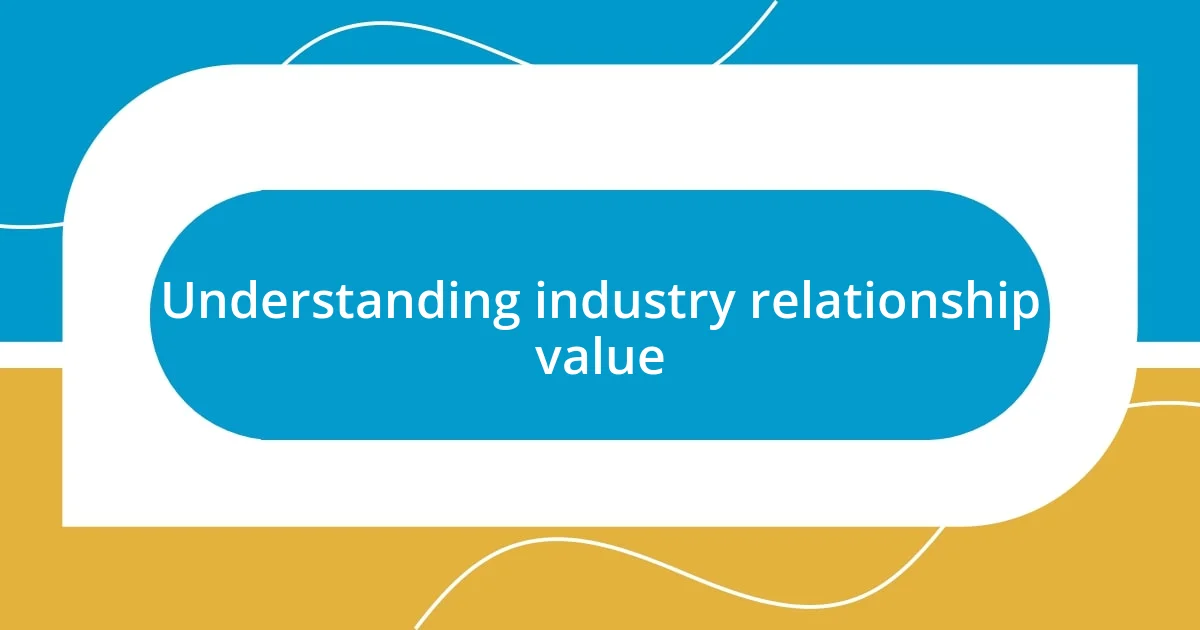
Understanding industry relationship value
Understanding the value of industry relationships is like discovering a hidden treasure. I remember early in my career, I connected with a mentor who guided me through my first major project. That mentorship not only bolstered my confidence but also opened doors to other opportunities that I never expected. Have you ever had a connection lead to a breakthrough? It’s amazing how a single relationship can shift your trajectory.
Each relationship you cultivate serves as a building block in your professional life. I often reflect on how partnerships can provide not just resources, but also emotional support during challenging times. When I faced a setback, a colleague reached out and reminded me of my capabilities, reinvigorating my determination. Isn’t it profound to think that sometimes our best assets are not our skills, but the people we surround ourselves with?
Moreover, relationships in our industry often foster a culture of collaboration and innovation. I’ve been involved in projects where the synergy between team members sparked creative solutions that wouldn’t have emerged in isolation. Imagine what could happen if we all leaned into our network more intentionally. When we understand the true value of our connections, we not only grow individually, but we also elevate our entire industry.
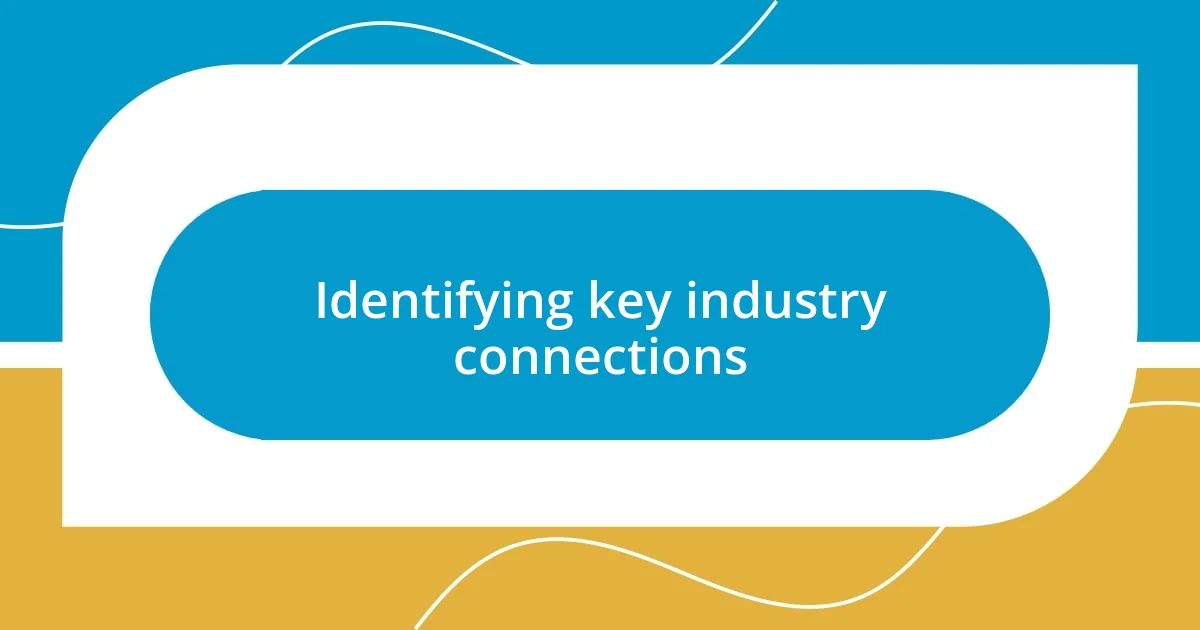
Identifying key industry connections
Identifying key industry connections requires a thoughtful approach. I’ve found that the best relationships often stem from authentic interactions. A few years ago, at a networking event, I struck up a conversation with someone who shared my passion for innovation. What started as a casual chat about trends evolved into a partnership, demonstrating that sometimes, the most valuable connections are those formed organically.
When you’re navigating your industry, keep an eye out for specific types of people who could add value to your network. Consider focusing on:
- Mentors: Experienced individuals who can guide you.
- Peers: Colleagues who share your journey and can relate to your challenges.
- Industry Leaders: Influencers who can offer insights and open doors.
- Supportive Allies: Those who champion your work and ideas.
By intentionally seeking out these connections, you create a rich web of support and collaboration that can enhance your professional journey.
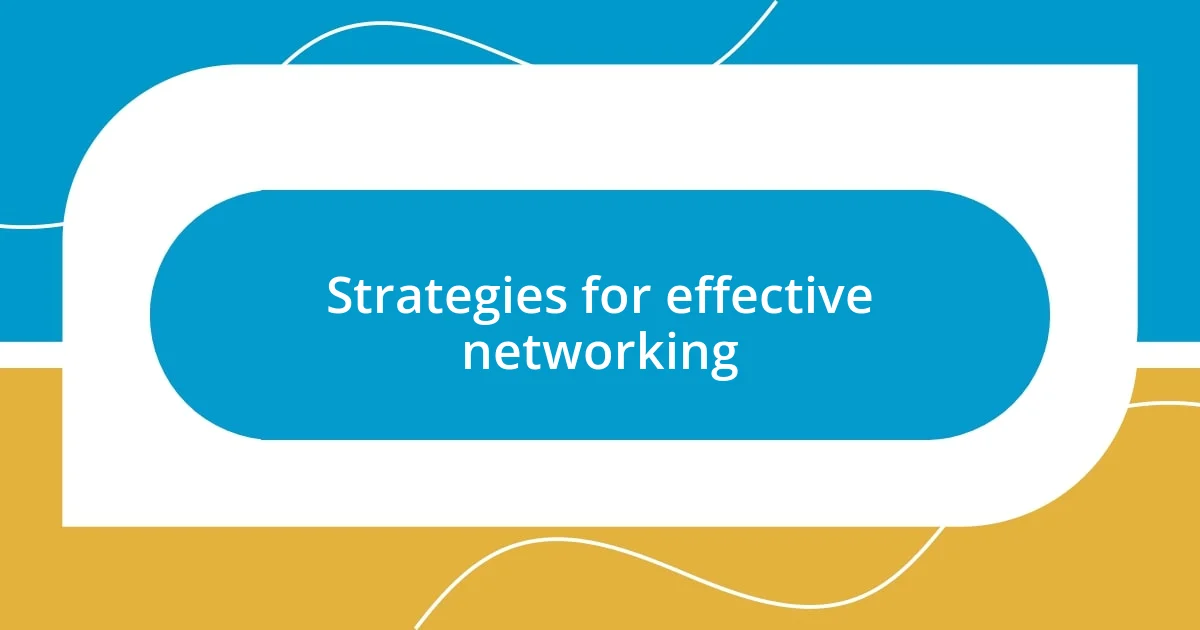
Strategies for effective networking
Strategies for effective networking involve both proactive outreach and genuine engagement. I distinctly remember attending a conference where I approached a speaker after their session. Instead of just exchanging business cards, I shared how their insights resonated with me personally. That connection led to an invaluable conversation about my career aspirations. Have you ever thought about the power of authenticity in networking? Genuine interest often transforms a fleeting interaction into a meaningful relationship.
Additionally, maintaining relationships is just as crucial as forming them. I make it a point to follow up with my contacts after meeting them, either through a quick message or a coffee catch-up. This simple gesture can create opportunities for collaboration and deeper understanding. I find that consistency in connection demonstrates that you value the relationship, which can sometimes lead to unexpected partnerships down the line. What strategies do you use to stay connected?
Lastly, pay attention to social media platforms. I’ve leveraged platforms like LinkedIn to not just connect, but to engage with industry content regularly. Liking, commenting, and sharing insights has allowed me to build a virtual presence and keep my connections alive. In a world where digital interaction is often preferred, don’t underestimate the impact of showing up in your network’s digital spaces.
| Strategy | Description |
|---|---|
| Authentic Engagement | Focus on real conversations and shared interests to foster deeper connections. |
| Consistent Follow-ups | Regularly reach out to maintain relationships and explore new opportunities. |
| Utilizing Social Media | Actively engage on platforms like LinkedIn to strengthen connections. |
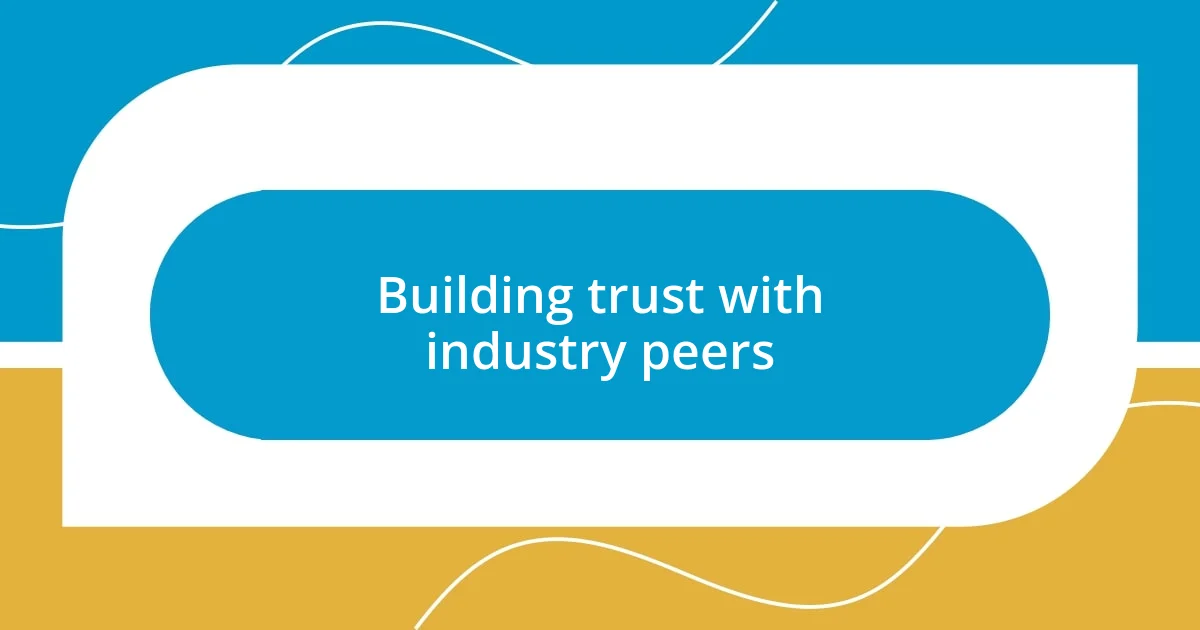
Building trust with industry peers
Building trust with industry peers is a delicate dance that requires both sincerity and consistency. I recall a time when I attended a small workshop, and instead of just mingling during breaks, I initiated deeper discussions with a few attendees. Sharing a personal story about a challenge I faced in my career not only revealed my vulnerability but also encouraged others to open up. Have you ever experienced how sharing your personal journey can create an instant bond? It’s often moments like these that lay the groundwork for lasting trust.
In my experience, transparency plays a vital role in fostering trust. I remember collaborating on a project where both my strengths and weaknesses were on display. By openly discussing my limitations, I invited my peers to do the same, transforming the working environment into one of mutual respect. When your colleagues know you’re genuine, it encourages them to be candid as well. Trust is like a two-way street; if you’re open, you invite openness in return. Can you think of a situation where honesty made all the difference in a professional relationship?
Building trust is also about being there for each other during tough times. I once supported a peer who was struggling with a project deadline; my willingness to pitch in strengthened our bond immensely. I find that these shared experiences – whether they’re victories or setbacks – deepen connections far more than mere professional exchanges ever could. Trust grows when you show up for your peers, even when it might not be convenient for you. When have you found that being there for someone else solidified your relationship?
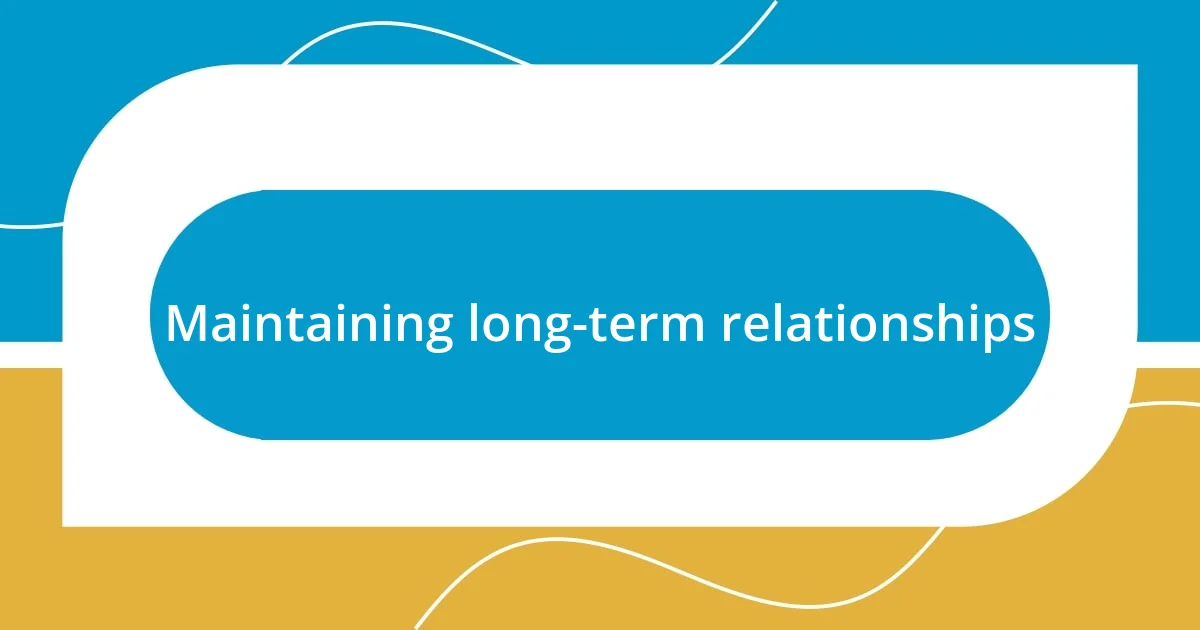
Maintaining long-term relationships
To maintain long-term relationships, I find that it’s essential to be proactive in reaching out. For instance, after a big event, I usually send a quick message to check in. It’s amazing how a simple “Hey, it was great connecting with you!” can open the door for ongoing conversations. This not only shows that I remember our interaction but also reinforces our connection in a meaningful way.
I also prioritize quality over quantity in my follow-ups. Instead of bombarding my contacts with generic messages, I try to send personalized notes. Whether it’s sharing an article relevant to their interests or just asking about their latest project, these tailored touches resonate more deeply. Have you ever received a message that felt crafted just for you? It’s those personal nuances that often make relationships feel special and cherished.
Moreover, I’ve learned that timing is crucial in maintaining relationships. I recall a time when I reached out to a former colleague during a challenging time in their career. Not only did it help them feel supported, but it also reignited our professional connection. It’s a reminder that being present when it matters most can solidify bonds in ways that routine interactions might not. What moments stand out in your memory where you felt your support truly made a difference?
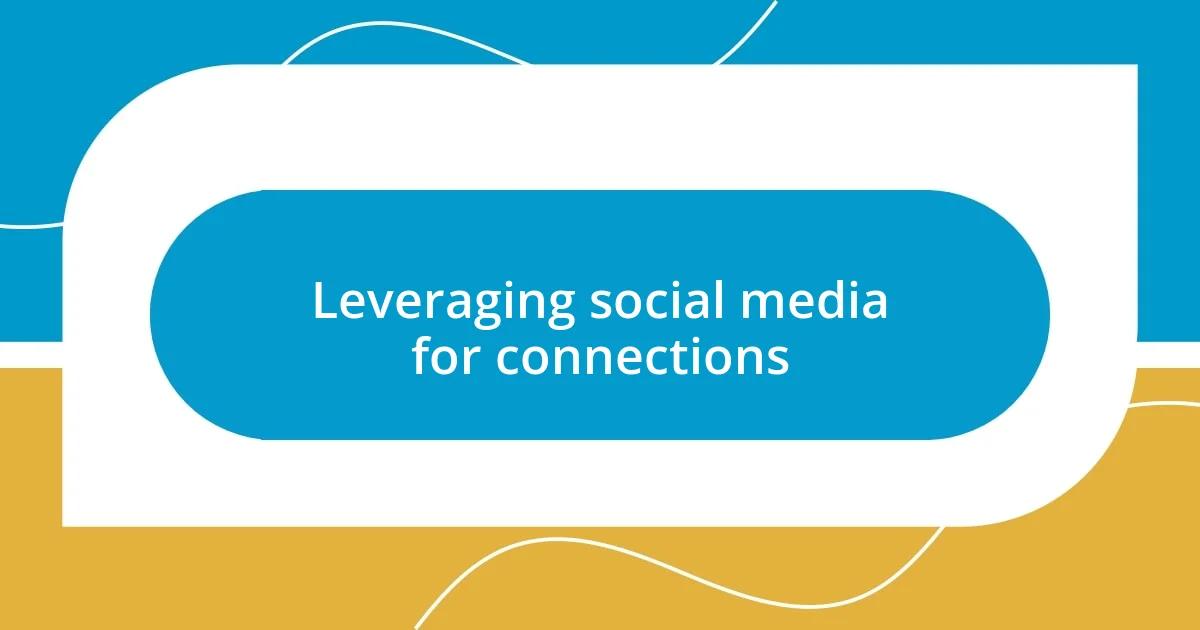
Leveraging social media for connections
When it comes to leveraging social media for connections, I’ve discovered it can be a powerful tool if used thoughtfully. I remember posting about a recent project I completed on LinkedIn; not only did it spark conversations, but it also led to an unexpected collaboration opportunity. Have you ever shared a success online and found it opened doors you’d never considered? People are drawn to authenticity, and sharing real experiences can help you stand out in the digital crowd.
Engaging with others on platforms like Twitter and Instagram can also be incredibly beneficial. I recall an instance where I commented on a fellow industry professional’s post, offering my perspective on their insights. This small interaction blossomed into a deeper conversation in private messages, ultimately resulting in a long-lasting mentorship. It truly highlights how a simple comment can plant the seeds for meaningful relationships. Have you ever connected with someone in this way? The beauty of social media is that it allows us to transcend geographical boundaries and build connections with like-minded individuals around the globe.
Additionally, I always make it a point to share content that resonates with my network. Whether it’s an inspiring article or an insightful podcast episode, I find that sharing valuable resources invites conversation. For example, I recently shared a thought-provoking TED Talk on industry trends that led several of my contacts to reach out for my opinion. This not only kept the dialogue going but also reinforced our connections in a casual yet impactful manner. How have you used content sharing to spark conversations with your peers? It’s a simple but effective way to show you care about what’s happening in your industry while maintaining those essential connections.
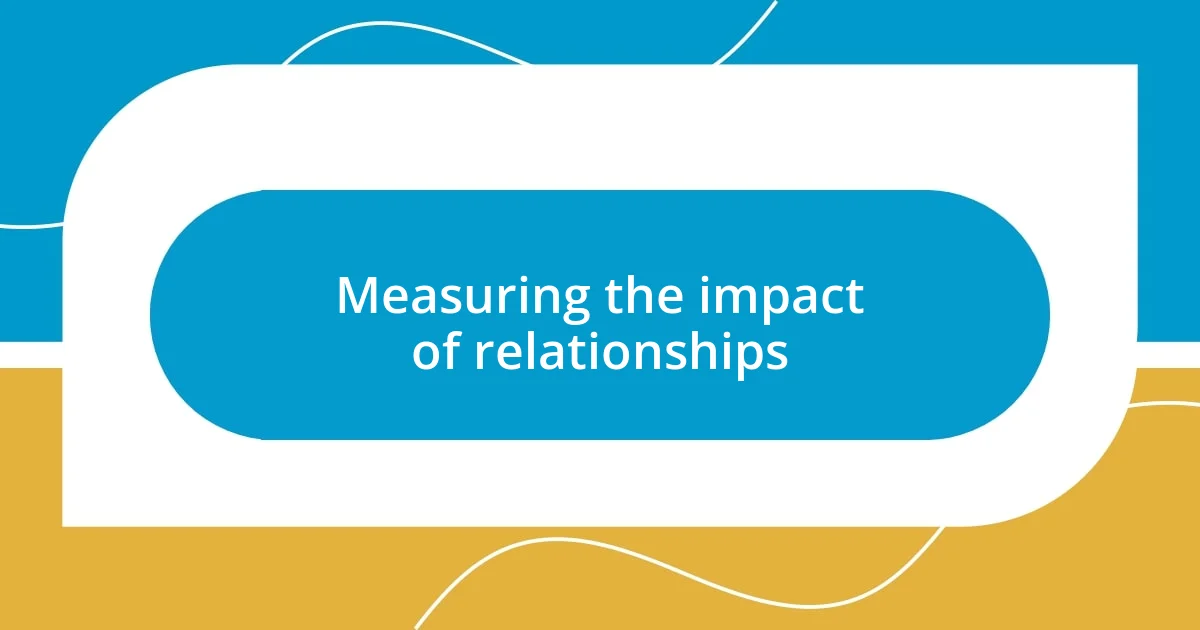
Measuring the impact of relationships
Measuring the impact of relationships isn’t always straightforward, but I’ve found some practical ways to gauge the effectiveness of my connections. For instance, I often reflect on changes in my network after significant interactions, noticing how new opportunities can emerge from a genuine conversation. Have you ever felt a shift in your career trajectory because of a meaningful relationship? It’s moments like these that highlight the true value of personal connections.
I also keep track of how often I engage with my contacts and the nature of our discussions. By noting the depth of our conversations—whether they revolve around industry challenges, personal insights, or mutual support—I can evaluate the strength of those bonds. One time, I realized that following up after a major industry event led to a mentorship that not only provided guidance but also significantly advanced my career. It makes me wonder: how much do you pay attention to the quality of your dialogues?
Lastly, feedback can be an impactful measure of relationship success. When someone reaches out to express appreciation for my support or guidance, it reinforces the notion that our interactions matter. I vividly remember when a former colleague thanked me for believing in their potential during a tough project phase; that appreciation solidified our bond and brought both of us new opportunities. How do you interpret feedback from your network? Engaging in this kind of reflective practice can truly illuminate the impact we have on each other professionally and personally.
